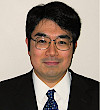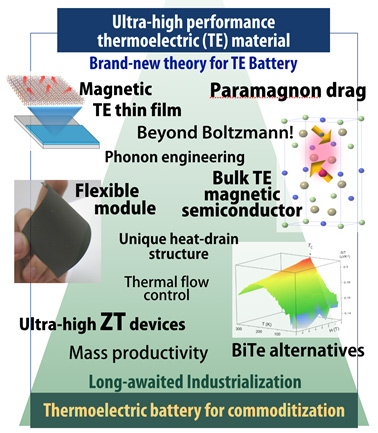Technology theme: Innovative thermoelectric conversion technologies for stand-alone power supplies for sensors
In Society 5.0, new value is expected to be created by having sensors acquire all information and having AI analyze the acquired information. In future, a huge number of sensors are expected to be installed in every situation, which makes it imperative to secure power sources to drive the sensors, and various technologies are being considered. One is thermoelectric conversion technology, that converts heat sources in the environment (e.g. exhaust heat, body temperature, etc.) directly into electricity. This technology is attracting attention as one that enables independent power supplies for sensors used in places where wiring is difficult or on moving objects, such as animals and humans. Unfortunately conventional thermoelectric conversion technology is not widely accepted because of material issues, such as resource restrictions, toxicity etc., and problems in mass productivity, reliability and cost due to the complex structure of elements. If you successfully solve these problems and develop an innovative thermoelectric conversion technology that enables independent power supplies for sensors, the sensors can be installed in every situation, contributing to the realization of Society 5.0.
Utilizing magnetism to develop high performance thermoelectric materials and devices

| R&D Period | 2019.11- |
|---|---|
| Grant Number | JPMJMI19A1 |
| Project Summary | Summary |
Summary:
In future Society 5.0, sensors will gather myriad data analyzed by AI to create new value. Thermoelectric modules are promising to supply power to innumerable sensors by directly converting ubiquitous thermal energy in the environment to electricity. In order to achieve the 200 year old dream of thermoelectric power generation application, we are challenging with new approaches. Utilizing magnetism, such as magnetic interactions and spin fluctuations, we have been able to realize significant thermoelectric enhancement.
Together with thin film effects, we aim to break through beyond the traditional confines, and realize ultra-high performance thermoelectric materials. As another critical strategy we have focused on methods for module production, which are industry and mass production compatible, i.e. semiconductor thin film devices and flexible hybrid sheets. With the world's leading thermoelectric team, we aim to lead the way and create a new industry and market, utilizing thermoelectric power generation for energy harvesting to power ubiquitous IoT sensors and devices for future society.

R&D Team
[Leading Institution]
National Institute for Materials Science (NIMS)
[Collaborators]
NIMS, AIST, TU Wien,U Tsukuba,U Tokyo, Tokyo U Sci.,Toyota Tech. U,Kyushu Tech. U
Project Website
https://b2c-project.jp/project
|
Affiliation and job title should automatically appear from the information that a researcher registered with researchmap.
Data may be outdated or undocumented. When there is not a connection via the internet, data are not displayed. |


